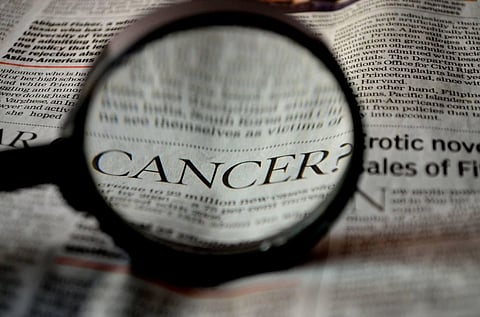
- Home
- न्यूजग्राम
- India
- World
- Politics
- Entertainment
- Culture
- Lifestyle
- Economy
- Sports
- Sp. Coverage
- Misc.
- NewsGram Exclusive
- Jobs / Internships

New Delhi, July 27, 2017: The recuperation of cancer patients undergoing chemotherapy is affected by their social interaction with other patients during treatment, according to a new study by researchers at the National Human Genome Research Institute (NHGRI), part of the National Institutes of Health, and the University of Oxford in the United Kingdom.
Cancer patients were a little more likely to survive for five years or more after chemotherapy if they interacted during chemotherapy with other patients who also survived for five years or more. The findings were published online July 12, 2017, in the journal Network Science.
"People model behavior based on what's around them," Jeff Lienert, lead author in NHGRI's Social and Behavioral Research Branch and a National Institutes of Health Oxford-Cambridge Scholars Program fellow. "For example, you will often eat more when you're dining with friends, even if you can't see what they're eating. When you're bicycling, you will often perform better when you're cycling with others, regardless of their performance."
Researchers examined the data from electronic medical records from 2000 to 2009 from two major hospitals in the United Kingdom's National Health Service. They also reviewed the room formation to confirm that the patients were positioned to interact.
"We had information on when patients checked in and out of the chemotherapy ward, a small intimate space where people could see and interact for a long period of time," Lienert said. "We used 'time spent getting chemotherapy in a room with others as a proxy for social connection."
According to the ANI report, when patients were around those during chemotherapy who died in less than five years following chemotherapy, they had a 72 percent chance of dying within five years following their chemotherapy. The best outcome was when patients interacted with someone who survived for five years or longer: they had a 68 percent chance of dying within five years. The researchers' model also predicted that if patients were isolated from other patients, they would have a 69.5 percent chance of dying within five years.
"A two percent difference in survival – between being isolated during treatment and being with other patients – might not sound like a lot, but it's pretty substantial," Lienert said. "If you saw 5,000 patients in nine years, that 2 percent improvement would affect 100 people."
The researchers didn't study why the difference occurred, but hypothesize that it may be related to stress response. "When you're stressed, stress hormones such as adrenaline are released, resulting in a fight or flight response," Lienert said. "If you are then unable to fight or fly, such as in chemotherapy, these hormones can build up."
While the researchers also didn't investigate the impact of visitors on cancer patients undergoing therapy, the effect would likely be similar, he said.
"Positive social support during the exact moments of greatest stress is crucial," Lienert said. "If you have a friend with cancer, keeping him or her company during chemotherapy probably will help reduce their stress. The impact is likely to be as effective, and possibly more effective than cancer patients interacting with other cancer patients."
The findings are published online in the journal Network Science.
-Prepared by Nivedita Motwani. Twitter @Mind_Makeup
NewsGram is a Chicago-based non-profit media organization. We depend upon support from our readers to maintain our objective reporting. Show your support by Donating to NewsGram. Donations to NewsGram are tax-exempt.
Click here- www.newsgram.com/donate
